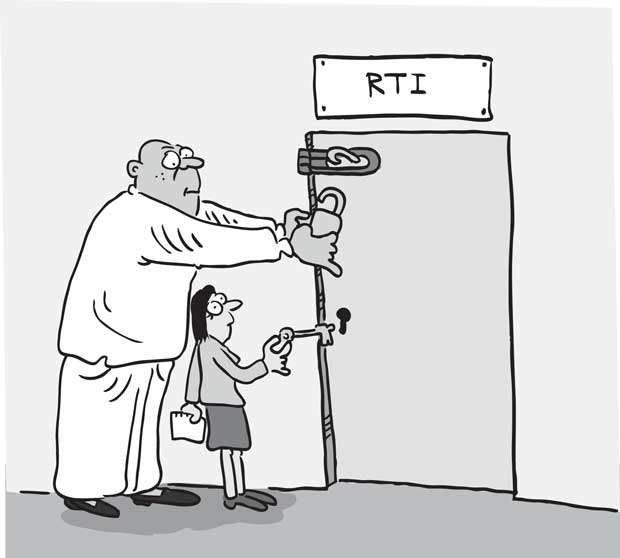IMPORTANT NOT TO DILUTE HARD-WON RTI VICTORIES

Some weeks ago, a group of Mannar based activists petitioned the Right to Information (RTI) Commission asking for details of the government’s transitional justice package of reforms following promises made to the Geneva based Human Rights Council when this government came into power. Following the hearing of the appeal, the Prime Minister’s Office released the proposed Reparations Bill to the RTI Commission. That was how the Bill came to be in the public domain.
The Human Rights Commission (HRCSL) which had been recently given A-grade status by the international monitoring agency looking at performances of national human rights institutions, has stated that one of its biggest problems was getting access to Bills as these were not given to the HRCSL. This is despite the fact that the HRCSL law required the Commission to make recommendations in regard to draft legislation. The HRCSL had correctly questioned as to how it can engage in this task when the Bills are not sent to it.
It is positive that draft laws are being released to the RTI Commission upon the direction of that Commission, which has been recently praised for its proactive stance and for showing ‘remarkable independence’ by the International Federation of Journalists (IFJ) in the 2018 assessment of press freedoms report, ‘Clampdowns and Courage.’ Earlier, the draft Disability Rights law was also released to the RTI Commission following an appeal filed by a legal activist.
But do activists actually need to use the RTI law for this purpose? Should not draft Bills be released to the people anyway as part of the automatic disclosure of the government as it is the people who will ultimately be affected by such laws? Do they not have the right to see the drafts beforehand and make proposals in regard to the issues that may concern them?
Where the Reparations Bill was concerned, the Mannar activists had asked the Commission for the information on the basis that the rural people do not know what is happening in Colombo. They had said that they wanted to see the contents of the Bill to avoid a situation as what happened in regard to the Office of Missing Persons Act. The OMP Act states that information cannot be asked for when it amounts to confidential information supplied by relatives of missing persons to the OMP. But, as many have pointed out, this means that even if the relatives or others want it to be published, the OMP is under no duty to do so.
From news reports after the release of the Reparations Bill, it has now become clear that though there are some restrictions similar to the OMP Act, at least the consent of the person who had given the information would be enough to have that information released under RTI where the Reparations Office is concerned.
Other Bills propose worse restrictions. Yesterday, the Right to Information Commission issued a statement detailing its concerns in regard to the proposed Audit Bill that seeks to restrict requests being filed for information to the Audit Commission, the Auditor General and others acting under their authority, until the reports are filed in Parliament.
The RTI Commission has pointed out that the RTI Act does not place specific categories or classes of documents or the functioning of specific offices beyond the reach of information requesters. The Commission has warned that if new laws seek to do this, that will bring about a ‘chilling effect’ on RTI and dilute the victories gained for Sri Lankans through the enactment of a globally-recognised law.
The RTI Commission has also said that this would risk a gravely negative impact on the embryonic development of the country’s Right to Information regime and discourage largely positive tendencies evidenced so far by Public Authorities in dismantling a decades-old culture of secrecy and denial of legitimate information. This is a caution that is well founded. It should be seriously taken into account by policymakers.

